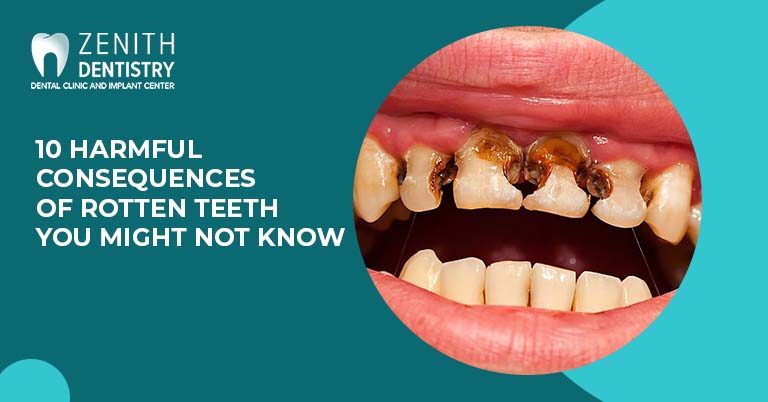
10 harmful consequences of Rotten Teeth you might not know
Rotten teeth occur when the enamel, the protective outer layer of the teeth, gets damaged due to the buildup of plaque and bacteria. This decay weakens the tooth’s structure and creates small holes or cavities. Without proper dental care, these cavities can deepen, leading to severe pain, infection, and even tooth loss.
The main cause of Rotten Teeth are poor oral hygiene, high sugar diet and acidic foods or drinks.
This dental issue affects people of all ages and can lead to severe consequences if left untreated. Let’s look into the various risks associated with rotten teeth and explore the importance of timely treatment.
Dangers of rotten teeth
The dangers of rotten teeth go beyond mere discomfort or cosmetic concerns. Here are some of the major risks associated with this oral health problem:
1) Pain and Discomfort
Rotten teeth can cause excruciating pain, making it difficult to eat, speak, or perform daily activities comfortably. This pain may radiate to the jaw and lead to headaches, affecting the overall quality of life.
As the infection deepens, it will expose the inner layers of the tooth, including the pulp and nerves. Bacteria can enter these spaces, causing severe infections, abscesses, and swelling in the face and neck. Untreated, rotten teeth can eventually lead to tooth loss.
2) Spread to the adjacent teeth
Infection from rotten teeth can spread to neighboring teeth, leading to a domino effect of decay and tooth loss if not addressed promptly.
3) Bad Breath
The bacteria responsible for tooth decay produce foul-smelling gases, contributing to persistent bad breath or halitosis.
4) Nutritional Deficiencies
Individuals may avoid eating nutritious foods due to the pain and discomfort caused by rotten teeth, resulting in nutritional deficiencies that affect overall health.
5) Shaking Hands
The immune system may gradually deteriorate as a result of having rotten teeth. As a result, the body may exhibit certain symptoms of weakness, such as trembling hands.
6) Low vitality
When teeth are decayed, it is common to feel less energized or vigorous. The low self-esteem that comes with having bad teeth could be one of the causes.
7) Bloodstream poisoning
Dentists strongly caution that leaving rotten teeth untreated can result in blood poisoning even though it is not an immediate threat. This occurs because the dental rot keeps building up in the mouth and, in most cases, being swallowed along with saliva. If this continues for a long time, the blood and digestive system become contaminated when the toxic element from the teeth mixes with those substances.
8) Gum Illness
Gum disease can develop over time if decayed teeth are not treated. The teeth may begin to rot at the root, but the infection will quickly spread to the gums. There are not many chances of fixing the problem when this happens.
9) Sepsis
Bacteria from an infected tooth can enter the bloodstream and cause sepsis, a medical condition. Sepsis is a blood infection that frequently affects people with weak immune systems, including hospital patients and people who are significantly younger or older. Elevated fever and a swift heartbeat are sepsis symptoms. Temperatures typically rise, while your heart rate elevates, with respiratory difficulty.
10) Meningitis
An abscessed tooth may develop into meningitis, a potentially fatal condition. This disease is caused by an inflammation of the membranes surrounding the spinal cord and brain. The virus may enter the bloodstream and travel to the spinal cord and the region surrounding the brain if the bacterial infection is left untreated.
Long-term hospitalization may be necessary for meningitis. Those with weakened immune systems are more likely to develop this condition.
Treatments for Rotten Teeth
Fortunately, early detection and appropriate treatments can prevent the dangers associated with rotten teeth:
- Fillings – Dentists can repair small cavities by removing the decayed portion and filling the space with various materials like amalgam or composite resin.
- Root Canal Treatment – For more extensive decay and infection, a root canal procedure may be necessary to remove the infected pulp and save the tooth.
- Dental Crowns – After a root canal or a significant cavity treatment, a dental crown may be placed to protect and strengthen the remaining tooth.
- Extraction – In cases of severe decay where the tooth cannot be saved, extraction becomes necessary to prevent further complications.
Bottom line
In conclusion, the dangers of rotten teeth extend far beyond the immediate pain and discomfort. The risks of tooth infections, tooth loss, and nutritional deficiencies can have serious consequences for overall health. Practicing good oral hygiene, maintaining a healthy diet, and scheduling regular dental check-ups can help prevent the development of rotten teeth and preserve a bright and healthy smile for years to come.






